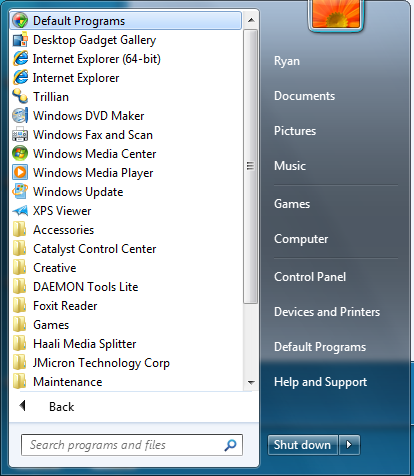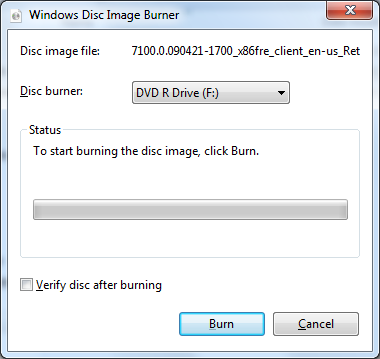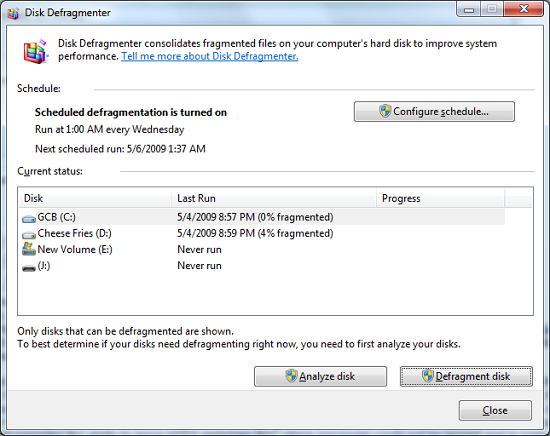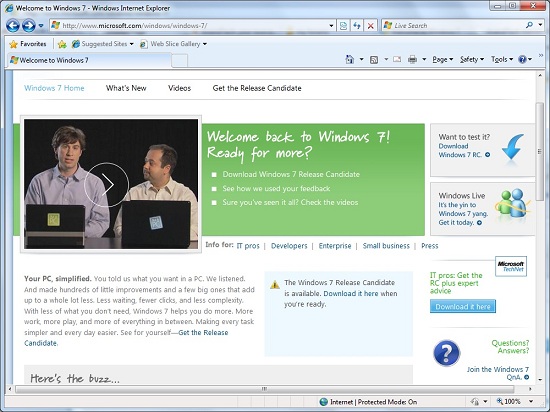Windows 7: Release Candidate 1 Preview
by Ryan Smith and Gary Key on May 5, 2009 11:00 PM EST- Posted in
- Systems
Internet Explorer 8 and the Rest
Rounding out our look at Windows 7’s applications, we have Internet Explorer 8. Recently released for both Vista and XP, IE8 is the latest salvo in the ongoing browser wars between Microsoft, Mozilla, Apple, Google, and Opera. We’re not going to go too in-depth here since it’s not a Windows 7-only feature and we’ll be doing a proper review soon, but as the default Windows browser it’s best to quickly hit on the high points.
Microsoft has taken a lot of well-earned flak for the compatibility of previous versions of Internet Explorer. As far as rendering and adherence to web standards goes, IE has been off in its own little world. Microsoft has finally taken a number of steps to resolve that, making IE behave in a much more standards-compliant manner, even though it breaks sites designed for IE’s previously quirky behavior when those sites don’t explicitly ask for IE to use that behavior (i.e. compatibility mode). It’s still not the most compliant browser out there, but it’s a great deal improved from where it was.
Furthermore the rise of AJAX and other JavaScript-heavy application types has necessitated the need for better JavaScript performance in IE, with IE picking up a garbage collector for JavaScript along with a higher performing JavaScript interpreter. Also new in IE8 is a privacy mode (InPrivate), a new type of search feature Microsoft is calling Accelerators, and separate processes for each tab to keep malfunctioning tabs from bringing down the rest. We’ll have a full work-up of IE8 later this month to look at these features in-depth, so stay tuned.
Meanwhile when it comes time to talk about the rest of the applications, Windows 7 is unusually bare. Microsoft has finally gotten around to following through with their desire to decouple some of the standard Windows applications from the operating system itself, so that they can upgrade the applications separately from the OS. As a result, the following applications are no longer included in Windows as of Windows 7: Mail, Calendar, and Movie Maker.

Missing: Half the applications that should come with the OS
All of them have been spun-off into Microsoft’s Windows Live service (joining previously spun-off Messenger) as part of what Microsoft is calling the Windows Live Essentials pack. While there’s probably a good reason for doing it exactly this way (it’s hard to add features when you’re a convicted monopolist) it’s little consolation to the fact that it makes Windows 7 extremely confusing to use. An operating system without an email client or a calendaring application? What is this, 1995? And what about IE? It’s decoupled from the OS too, and yet it’s still included by default.
At least with Vista and its spun-off Messenger, Microsoft replaced Messenger with a link to the Windows Live website to download it. However with Windows 7 there’s absolutely no indication of where they went unless you start searching the help files. We’ll cut Microsoft some slack here since this is just a Release Candidate, but if this is how they intend to ship the final version (and it probably is) then there is likely to be a number of confused users once Windows 7 launches.

One Windows Live Essential install later, and we have Mail
One notable addition to Windows 7 is that Windows has finally gained some basic ISO disc image handling abilities. Unfortunately it’s not the ability to mount them as a virtual drive like Mac OS X can, but Windows 7 at least gets it half-right by getting the ability to burn them. The new Windows Disc Image Burner fulfills exactly this role, and is invoked by right-clicking on ISO files. It may not sound fancy, but with software increasingly being distributed on ISOs these days (including Windows 7 RC1 itself) it’s undoubtedly handy.

We can't mount them, but at least we can burn them
Last but not least, Disk Defragmenter has received an overhaul in looks and features in coming from Vista. With respect to looks, Microsoft hid the fragmentation status of a hard drive in Vista on the belief that users found it to be superfluous information, and they have restored that information for Windows 7 after receiving negative feedback in order to satiate the power users who wanted that missing information. With respect to features, Microsoft has given Disk Defragmenter the ability to move NTFS metadata files, which previously could not be moved and in some situations unnecessarily blocked the shrinking of partitions as a result. Disk Defragmenter is now also capable of recognizing SSDs, and will block the defragmentation of those disks since defragmenting is of no use due to wear-leveling algorithms.

The new Disk Defragmenter











121 Comments
View All Comments
Gary Key - Thursday, May 7, 2009 - link
Actually, the public release of the 8.612 betas work fine with the HD 4770. AMD made a couple of changes right before they were posted on the site. :)CSMR - Wednesday, May 6, 2009 - link
Best source of information on Windows 7 by far. Nice work!ssj4Gogeta - Wednesday, May 6, 2009 - link
In the article you said that the "Jump Menus" have their roots in OS X? Not at all. They've been their for years. The only example I can think of at this time is Winamp. It had a "jump menu" in Windows 98 for controlling playback.Axell - Wednesday, May 6, 2009 - link
Well, this is actually Windows 7 Release Candidate. There won't be a second RC, so it's "Release Candidate" only, no RC1 like the title and text suggests.vectorm12 - Wednesday, May 6, 2009 - link
Just for the sake of argument.Ever thought about how long it usually takes for MS to actually make their OS:es work well? Doesn't anyone remember what a abysmal OS XP was before SP1 let alone SP2(which in my opinion was the point where I felt confident enough to upgrade from win2k). I'm starting to wonder if people have actually forgotten how much they where complaining about XP before SP1&2 or if they just don't want to remember. What about the security vulnerabilities that still plague XP? The fact that both Vista and Win7 improves on these seem to have been lost in the quest to keep XP alive.
After all do you hear Apple users complaining about 10.5.6 being significantly slower in many respects than 10.4? The fact that 10.4 in my opinion had a bunch of features lost in 10.5 that where really useful doesn't seem to bother them half as much. In the end I think this whole discussion has become more of a "hey I'm cool for bashing Microsoft and Vista rather than keeping an open mind and actually seeing the improvements they make"
How long did it take for Microsoft to make windows 2k a better OS than NT4.0 besides the USB support (which for the first couple of years was more or less pointless anyway).
Windows 95 and RC2 and so on. I mean it usually takes years for MS to actually make a OS superior to the older version.
What sets Windows7 apart from Vista in my opinion is just that.
Windows 7 may as well be a dressed up/optimized/"insert random comment" version of Windows Vista. Sure they could have made major GUI changes and feature updates to Vista through service packs etc but the fact is that when people hear or think vista it usually equals "dog turd" or worse and usually that is because it's become cool to bash Vista. In my opinion I wouldn't hesitate to run Vista SP1 on our studio computer where I work but unfortunately most of the software required for production purposes require specific software configurations which means Vista isn't supported other than in the latest releases.
The name change is a chance for people to try what in many ways is a vastly improved OS without having that association in mind when doing so. Sure Windows 7 is still more bloated and in certain areas probably slower than XP because of bloated code/new functions etc but the fact is Microsoft has actually taken a lot of great functionality in vista and(most likely taken inspiration from Mac OS in certain areas) and improved upon it even further.
I for one want a Microsoft OS for my gaming computer. I can't be bothered running Linux and wine just to play WoW and run the Adobe suite. Given the choice I'm going for Win7 rather than XP or vista, it's safer, I've got performance to spare and there's nothing wrong with a little eyecandy to make things look more exciting.
Macs are fine but to be honest I don't like OS x THAT much to pay the premium.
Linux works perfectly on my work computer and on the servers I run at work or on my laptop that I use to surf the web.
leexgx - Wednesday, May 6, 2009 - link
apart from some drivers XP has allways worked well for me (+ i was behind an router so RDP basid worms was not an problem),Vista is slugish and bloted for the most part and it allways will be as thay not port stuff to vista that are makeing windows 7 run far more smoother,
i have loaded win 7 onto an amd64 3000+ 2ghz, 2gb ram, it works well there is One small bug not sure why but it thinks i got 16gb installed in an socket 754 socket lol, but lists 2gb useable (at least Win7 now Shows Both numbers useable and installed as on SP1 for vista that was an joke hideing useable ram) need to report that to MS but not sure where i submit that
Lexington02 - Wednesday, May 6, 2009 - link
:face palm:You have 32 bit and that is not MS's fault for 32bit portion, it is pure math. Also 64 bit will always be slower than 32 bit on the same specs. Think about it, 64 is twice as big as 32 bit...
Bmadd - Wednesday, May 6, 2009 - link
If any of that was refering to my post my Thanks MS was for giving me the features i wanted and not having to go to win7. Not that they make bad products. I love the one ppl "hate" the most. PS xp needs to be laid to rest, pleaseiAURA - Wednesday, May 6, 2009 - link
I'm in the same boat as the above poster, all I will get from W7 is a "funner" GUI and DX11, but hey, there's still tons of game being released as DX9 games.ssj4Gogeta - Wednesday, May 6, 2009 - link
DX11 will be released for Vista as well.